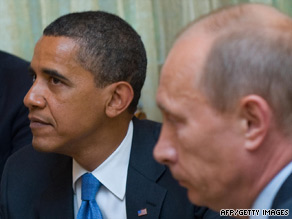Obama: No green light for Israel to attack Iran
- Story Highlights
- President Obama says U.S. "absolutely not" giving Israel go-ahead to attack Iran
- Israel is concerned about Iran's nuclear ambitions
- Vice President Biden on Sunday appeared to leave door open for Israel to attack Iran
- Israel needs to find way not to "create major conflict in the Middle East," Obama says
MOSCOW, Russia (CNN) -- The United States is "absolutely not" giving Israel a green light to attack Iran, U.S. President Barack Obama told CNN Tuesday.

President Obama meets Tuesday with Russian Prime Minister Vladimir Putin near Moscow.
"We have said directly to the Israelis that it is important to try and resolve this in an international setting in a way that does not create major conflict in the Middle East," Obama said, referring to Iran's nuclear ambitions.
Obama has been in Moscow for a summit aimed at trying to reset the U.S.-Russian relationship.
On Sunday, U.S. Vice President Joe Biden appeared to leave the door open for Israel to attack Iran if it saw fit.
"Israel can determine for itself -- it's a sovereign nation -- what's in their interest and what they decide to do relative to Iran and anyone else," Biden said on ABC's "This Week."
Obama said Tuesday that Biden had simply been stating a fact, not sending a signal.
"I think Vice President Biden stated a categorical fact, which is we can't dictate to other countries what their security interests are. What is also true is that it is the policy of the United States to resolve the issue of Iran's nuclear capabilities in a peaceful way through diplomatic channels," he said. ![]() Watch CNN's Ed Henry interview President Obama »
Watch CNN's Ed Henry interview President Obama »
Don't Miss
The top U.S. military leader, Adm. Mike Mullen, said later on Tuesday that he understands Israel's position.
"The Israelis see Iran achieving a nuclear capability as an existential threat, and that fact is tied to the rhetoric of the leadership of Iran, which ... has said that they would seek to eliminate Israel," said Mullen, the chairman of the Joint Chiefs of Staff.
His counterparts in the Gulf also understand the Israeli stance, whether or not they agree, Mullen said.
"That gets back to the criticality ... of solving this before Iran gets a nuclear capability, or that anyone... would take action to strike them. And I think that window is a very narrow window," he said in a speech at the Center for Strategic and International Studies in Washington.
He said he hoped diplomacy would resolve the issue.
"I am hopeful that that dialogue is productive. I worry about it a great deal if it's not," Mullen said.
The State Department took a similar line on Monday.
"Our goal here is to prevent Iran from obtaining nuclear weapons. When I say 'our' it is just not the United States -- it is the international community," spokesman Ian Kelly said. "Israel is a sovereign country. We are not going to dictate its actions. We also are committed to Israel's security and we share Israel's deep concerns about Iran's nuclear program."

Asked if this could be interpreted as the United States flashing a green light for Israel to attack Iran's nuclear sites, Kelly said, "I certainly would not want to give a green light to any kind of military action."
The Israeli government considers Iran's nuclear program to be the dominant threat facing the country.
CNN White House Correspondent Ed Henry in Moscow and CNN's Emily Sherman in Washington contributed to this report.
All About Barack Obama • Iran • Israel

 Sit tight, we're getting to the good stuff
Sit tight, we're getting to the good stuff
